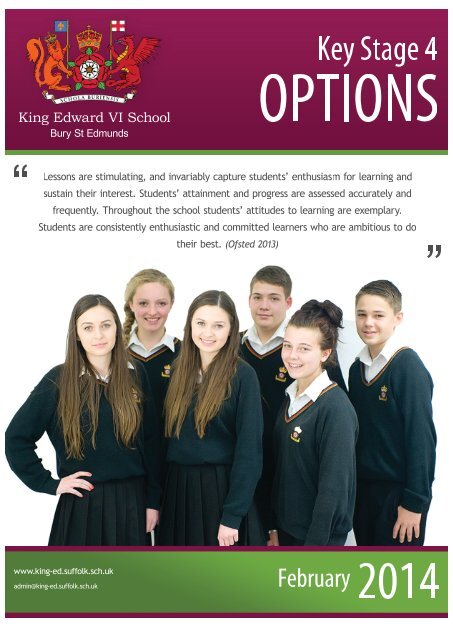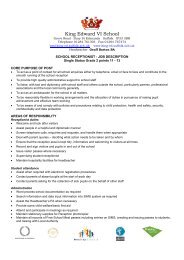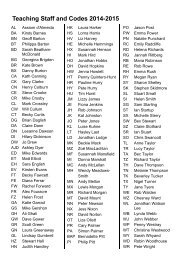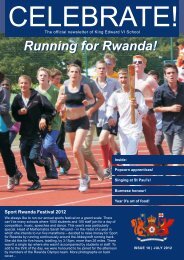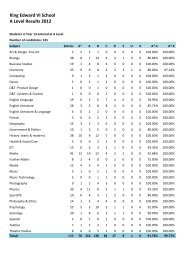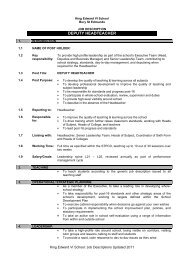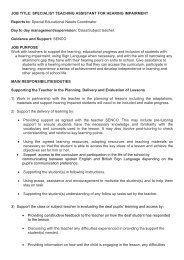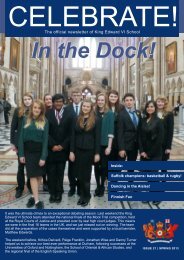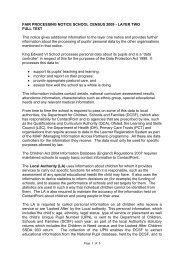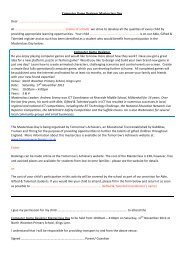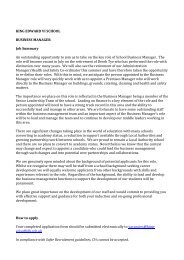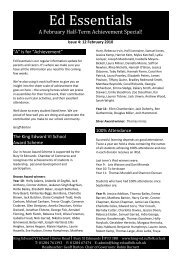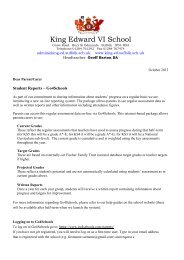Key Stage 4 Options Brochure
Key Stage 4 Options Brochure
Key Stage 4 Options Brochure
- No tags were found...
You also want an ePaper? Increase the reach of your titles
YUMPU automatically turns print PDFs into web optimized ePapers that Google loves.
Obligacions (accions) adicionals delconsellerEl consejero deberá encargarse, igualmente, de la comprobación de los procedimientos y prácticassiguientes en relación con las actividades implicadas:a) Los procedimientos encaminados a la observancia de lasreglas sobre identificación de las mercancías peligrosastransportadas.b) La valoración de las necesidades específicas relativasa las mercancías peligrosas, en la adquisición de medios detransporte.c) Los procedimientos que permitan comprobar elmaterial utilizado para el transporte de mercancías peligrosaso para las operaciones de carga o descarga.d) Que el personal implicado de la empresa haya recibido unaformación adecuada y que dicha formación figura en suexpediente.e) La aplicación de procedimientos de urgencia adecuadosen caso de accidentes o incidentes que pueden afectar a laseguridad durante el transporte de mercancías peligrosas odurante las operaciones de carga o descarga..f) La realización de análisis y, en caso necesario,la elaboración de partes sobre los accidentes, incidenteso infracciones graves que se hubiesen comprobado enel curso del transporte de mercancías peligrosas, o durantelas operaciones de carga o descarga.g) La aplicación de medios adecuados para evitar larepetición de accidentes, incidentes o infracciones gravesh) La observancia de las disposiciones legales y laconsideración de las necesidades específicas relativas altransporte de mercancías peligrosas en lo referente a laelección y utilización de subcontratistas o tercerosintervinientes.i) La comprobación de que el personal encargadodel transporte de mercancías peligrosas o de la cargay descarga de dichas mercancías dispone deprocedimientos de ejecución y de consignas detalladas.j) La realización de acciones de sensibilización acercade los riesgos ligados al transporte de mercancíaspeligrosas o a las operaciones de carga o descarga dedichas mercancías.k) La aplicación de procedimientos de comprobación conobjeto de garantizar la presencia, a bordo de los mediosde transporte, de los documentos y de los equipos deseguridad que deban acompañar a los transportes, y laconformidad de dichos documentos y equipos con lanormativa.l) La aplicación de procedimientos de comprobación conobjeto de garantizar la observancia de las reglas relativasa las operaciones de carga y descarga.Jornada ACCSCAT – juny 2013 -Vicent Salom – BASF Española, S.L.4
How should I make my choices?There are 3 different curriculum areas offering courses. These are:1. Cultural (eg History, Spanish, Business)2. Creave (eg Drama, Art, Music)3. Scienfic (eg Technology, ICT, Home Economics, Child Development, Triple Science).Before you choose courses, think about your strengths and weaknesses, and your preferred style oflearning. Some students like hands-on praccal work. Many like courses that offer work-related elements.Others like to be able to undertake major coursework projects, whilst some prefer examinaons. If youopt for 2 subjects which contain major coursework projects it is important to consider the workload thatthis will entail. You would need to be a student who is capable of meeng regular coursework assignmentdeadlines. Certain subjects should not be combined other than with the agreement of the teaching staff :-Art and Texles; Product Design and Systems & Control.What is a good reason to choose a course?You should base your choices on:• subjects you are good at - this will lead to beer movaon and your best final results• subjects which interest you, which you enjoy and which you want to study for two years• subjects which may help you with your future career (if you already have some idea of what this mightbe).Do not choose a parcular course just because you get on well with the teacher or because a friendchooses it. The chances are that you will have a different teacher next year and you may not be in the sameclass as your friend.AssessmentAt the top of each informaonpage a summary of theassessment is clearly setout. Some people find thatcoursework suits their way ofworking. Other people preferto be assessed mainly throughexaminaons.01284 761393 www.king-ed.suffolk.sch.uk/Parents/<strong>Key</strong> <strong>Stage</strong> 4 Opons 5
Will I get my first choices?We will do our best to give you your first choices, but that is not always possible, so you will be askedto show reserves. Most courses have maximum numbers that they can accept because of the limits ofspecialist rooms and staff.If a course has too many applicants you may be asked to write a leer to explain why you have chosen thiscourse, and applicants will be accepted on the basis of the leer. Note that some courses can be taken inthe Sixth Form even if not taken at GCSE, eg Business and ICT.For a course to be taught it must have been chosen by a sufficient number of students.What do I do now?• Read this informaon booklet carefully• Talk things over with your parent/carer, teachers and tutor, and anyone else who can advise you• Decide on your courses and put them in order of priority• Record your choices of opons on the parental copy for your records• Finally, when you are sure that everything is right, transfer your choices on to the cream reply slip at theend of this booklet• Ask your parent or carer to sign it• Hand the sheet in to your tutor by Friday 14 March at the latest.On the following pages you will find an outline of the choices you can make, followed by pages giving fullinformaon about all courses. This will help you make your decisions.01284 761393 www.king-ed.suffolk.sch.uk/Parents/<strong>Key</strong> <strong>Stage</strong> 4 Opons 7
COMPULSORY CORE SUBJECTSSUBJECT CONTENT NOTESEnglishIn English Language you will improve yourreading, wring and speaking & listeningskills.In English Literature you will study poetry,prose and drama.Most students will take both GCSE EnglishLanguage and GCSE English Literature.GCSE English Language is required formost future courses and careers.A small number of students will follow theGCSE English course which will count asone GCSE.An Entry Level Cerficate is also available.MathemacsThe course covers 4 strands over 2 exams:• Number & algebra• Shape, space & measure• Handling data• Using and applying.You will improve your logic, funconal andproblem-solving skills.GCSE Mathemacs is required for mostcourses and careers.The GCSE exams are linear, which meansthat they are both taken at the end ofYear 11. Some students may also beencouraged to take a GCSE in Stascsalongside their Mathemacs GCSE. Thisis parcularly useful for those who areconsidering studying Mathemacs atpost-16 level.SciencePhysicalEducaonMost students will follow a two-yearcourse which will lead to 2 GCSEs inScience at the end of Year 11.You may, alternavely, take Triple Science(3 GCSEs) studied in the core plus oneopon if you reach Level 6 in <strong>Key</strong> <strong>Stage</strong> 3Science.The course is designed to build yourself-esteem, fitness and teamwork. Itcovers a range of skills and acvies,including less common areas such as yogaand maral arts.There are important GCSE exams in Juneof Year 10, which will decide the grade ofthe first GCSE in Science. Further exams atthe end of Year 11 will decide the grade ofthe second GCSE.A small number of students will beselected to take the Cambridge Naonalscourse as an alternave to AddionalScience in Year 11.Sports Leader Award 1 & 2 are taken inmetabled compulsory PE lessons and donot count as an opon choice.PersonalDevelopmentProgrammeThis course will incorporate a wide varietyof topics, offering a range of learningopportunies:• Cizenship Educaon• Personal, Health and Social Educaon• Financial Educaon• Careers and Work-Related Learning.This course is designed to supportthe development and well-being ofall students, preparing them to play afulfilling adult role in society.01284 761393 www.king-ed.suffolk.sch.uk/Parents/<strong>Key</strong> <strong>Stage</strong> 4 Opons 8
OPTIONAL COURSESFinal hints on making choices:• Aim for a broad range of choices• If you are uncertain about whether two courses will go together, please talk to the course teachers,your tutor or College Team.Courses we offer:ENTITLEMENT AREA COURSE QUALIFICATION GUIDANCE NOTESCultural LearningApplied Business Studies Applied GCSE Counts as 1 choiceBusiness Studies GCSE Counts as 1 choiceEconomics GCSE Counts as 1 choiceFrench GCSE Counts as 1 choiceGeography GCSE Counts as 1 choiceGerman GCSE Counts as 1 choiceHistory GCSE Counts as 1 choice –select which opon youwant to studyPhilosophy & Ethics GCSE Counts as 1 choicePsychology GCSE Counts as 1 choiceSociology GCSE Counts as 1 choiceSpanish GCSE Counts as 1 choiceCreave LearningArt GCSE Counts as 1 choiceDance GCSE Counts as 1 choiceDrama GCSE Counts as 1 choiceMedia Studies GCSE Counts as 1 choiceMusic GCSE Counts as 1 choicePhysical Educaon GCSE Counts as 1 choiceTexles GCSE Counts as 1 choiceContinued overleaf....01284 761393 www.king-ed.suffolk.sch.uk/Parents/<strong>Key</strong> <strong>Stage</strong> 4 Opons 9
ENTITLEMENT AREA COURSE QUALIFICATION GUIDANCE NOTESScienfic LearningChild Development GCSE Counts as 1 choiceD&T:Graphic ProductsD&T:Product DesignD&T:Systems & ControlGCSEGCSEGCSECounts as 1 choiceCounts as 1 choiceCounts as 1 choiceEngineering GCSE Counts as 1 choiceHealth & Social Care GCSE Counts as 1 choiceHome Economics:Food & NutrionGCSECounts as 1 choiceCompung GCSE Counts as 1 choiceInformaon &CommunicaonTechnologyMotor VehicleEngineeringGCSEIMIAL Level 1 Award inVehicle Maintenance(QCF)IMIAL Level 1 Cerficatein Vehicle Maintenance(QCF)Counts as 1 choiceCounts as 1 choiceTriple Science GCSE Core Science + oneopon choice01284 761393 www.king-ed.suffolk.sch.uk/Parents/<strong>Key</strong> <strong>Stage</strong> 4 Opons 10
APPLIED BUSINESS STUDIESInformaon from:Mrs Quintero-Hunt or Miss HemmingsAssessment:• 60% controlled assessment• 40% examinaon based on mulple-choice,short & extended answersCourse contentApplied Business is a course where you will invesgate how real businesses work, and gain anunderstanding of business finance. It is ‘applied’ because you use what you learn to understand thebusinesses you invesgate.You will learn about and understand the world of business by invesgang small and large, local andnaonal businesses. You will also develop skills in the financial aspects of business. Because you will carryout research, both within and away from the classroom, you will learn how to work in a team with othermembers of the class. You will learn through invesgaon in addion to listening and reading.There are two main aspects of business that you will learn about.Unit 1 - Invesgate How Businesses WorkThis unit is an invesgaon into what business enterprise is all about, including how businesses areorganised and how people are involved. It also looks at new issues such as ‘ethical’ and ‘green’ business.The unit is assessed through an internal controlled assessment that is carried out in the classroom undercontrolled condions. There will be an opportunity to research and invesgate in groups, but the wrienwork is carried out individually.Unit 2 - Financial RecordsThis unit focuses on how businesses record financial transacons, make payments and keep recordsof how they are doing. You will learn about balance sheets, profit and loss accounts, and how to usethese to understand business performance in a praccal context. This unit is assessed through a wrienexaminaon.As part of the course, at the end of Year 10, you can apply to work for one week in a local business. Here,you will learn about the aims and objecves of the business, study the nature of the business acvity,and learn about the financial side of the business. You can also use this work experience to help you carryout your research for the controlled assessment. As well as a work experience placement, there will beopportunies to aend business presentaons and visit businesses, which will give you a praccal view ofyour studies. Students taking this subject will be asked for a voluntary contribuon of £20 to cover the costof work experience.Work-related learning• You will talk to people who run their own businesses or have management posts• You will learn the different types of businesses that operate in the economy• You will learn the different departments and roles that exist within a business• You will learn how to use a range of financial documents in business• You can apply to go on work experience for one weekProgression routes• Post-16 Business Sudies• Careers in Business01284 761393 www.king-ed.suffolk.sch.uk/Parents/<strong>Key</strong> <strong>Stage</strong> 4 Opons 11
BUSINESS STUDIESInformaon from:Mrs Quintero-Hunt or Miss HemmingsAssessment:• 25% controlled assessment• 75% examinaonCourse contentThe Business Studies GCSE course involves invesgang how businesses operate. You will learn the skills neededto manage a business organisaon, from recruing staff through to ensuring quality in products.When running a business you will learn how to choose staff and movate them, and how to manage resources toget the best value for money.Selling a product or service successfully takes careful planning, and you will learn how to choose the best group ofcustomers to target, and how to design a markeng campaign.Managing money is vital to every business, and you will learn how to control the flow of cash into and out of thebusiness, and how to keep accounts.Firms are oen affected by unexpected changes in demand, taxes, rising prices and even events abroad, and youwill learn how businesses cope with these situaons.There will be opportunies to aend business presentaons and workshops from a variety of local businessorganisaons, which will give you a praccal view of your studies.You will study a local business as part of your assessment for the controlled assignment, examining currentbusiness problems and idenfying relevant soluons.You will use ICT to research firms, write reports and prepare presentaons on your business soluons. Our <strong>Key</strong><strong>Stage</strong> 4 Business Studies room has 16 computers to support your learning and development.Work-related learning• You will talk to people who run their own businesses or have management posts• You will study the management skills essenal for most jobs• You will learn how to apply for a job and how to select suitable employees• You will learn how to manage financesProgression routes• Post-16 Business Studies• Careers in Business01284 761393 www.king-ed.suffolk.sch.uk/Parents/<strong>Key</strong> <strong>Stage</strong> 4 Opons 12
ECONOMICSInformaon from:Mrs Quintero-Hunt or Miss HemmingsAssessment:• I00% examinaonCourse contentThis course will help you to understand the world around you. It introduces students to the study of howthe forces of supply and demand allocate scarce resources. It examines microeconomic factors such as thebehaviour of firms, consumers, and the role of government, and macroeconomic factors such as inflaon,unemployment, industrial producon, and the role of government. It relates economics to the real world inwhich we live, and also emphasises the increasing importance of the global economy to all naons.You will use an enquiring and crical approach to make informed judgments about a range ofcontemporary issues that arise from the impact of economic acvity. It is a challenging, academic course,where a high level of logical and mathemacal ability is desirable.Unit 1 - How the Market Works• What is the economic problem?• What are compeve markets?• How do firms operate in compeve markets?Unit 2 - How the Economy Works• What are the economic objecves of a government?• How does the UK government raise and spend its money?• Which policies can the UK government use?Unit 3 - The UK Economy and Globalisaon• Why do countries trade?• Why is the UK in the European Union?• How is the UK’s internaonal trade recorded?• How important is the value of a currency?• How does a country become compeve?• Why do less-developed countries struggle to achieve growth and benefit from internaonal trade?• What measures may be used to support growth for less-developed countries?Work-related learning• You will talk to people who run their own businesses or have management posts• You will learn the different types of businesses that operate in the economy• You will learn how to use a range of financial documents in businessProgression routes• Post-16 Business Studies; BTEC naonal, careers in business01284 761393 www.king-ed.suffolk.sch.uk/Parents/<strong>Key</strong> <strong>Stage</strong> 4 Opons 13
FRENCHInformaon from:Ms WebbAssessment:• 40% examinaon in listening and reading• 60% controlled speaking & wringCourse contentStudents follow a course which builds on what they have learnt in KS3. The emphasis is on communicaon,and covers four main themes:• Lifestyle• Leisure• The world of work• Home and environment.The four key skills of Listening, Reading, Speaking and Wring are equally important. French is a popularforeign language, and France one of the most popular tourist desnaons for Brish cizens. Other thanEnglish, French is the only language spoken on all five connents.Language skills are in great demand with employers, and graduates with a language are more likely to findemployment than other graduates. Studying a language will form a part of the English Baccalaureate.Students intending to apply to university should be aware that they may be disadvantaged without alanguages qualificaon.During the course there may be opportunies to visit France or a French-speaking country.Work-related learning• You will learn about the world of work• You will study possible careers related to law, business and the tourist industryProgression routes• Post-16 French• All careers requiring a foreign language01284 761393 www.king-ed.suffolk.sch.uk/Parents/<strong>Key</strong> <strong>Stage</strong> 4 Opons 14
GEOGRAPHYInformaon from:Mrs RyanAssessment:• 75% examinaon• 25% controlled assessment based on fieldwork in CambridgeCourse content“You can travel the seas, poles, and deserts and see nothing. To really understand the world you need toget under the skin of the people and places. In other words, learn about geography. We’d all be lost withoutit” - Michael Palin.The world in which we live is likely to change more in the next 50 years than it has ever done before.Geography will help you understand that our planet is a shiing, complicated system, of which peopleare only one part. In a world that faces climate change, pandemics, drought, war, energy shortages, massmigraons and terrorism, that viewpoint has never been more relevant.The course covers important and challenging topics such as:Unit 1 Physical Geography• The Restless Earth• Living World• The Coastal ZoneUnit 2 Human Geography• Populaon Change• Development Issues• TourismThe controlled assessment work will be completed by the end of Year 10. Students will sit both unit 1 andunit 2 exams at the end of Year 11.The skills and qualies developed through studying Geography are highly desirable to universies andemployers. Geography can form a part of the English Baccalaureate.Work-related learning• You will study possible careers related to geography and the environmentProgression routes• Post-16 Geography• Careers requiring good informaon skills• Teaching• Environmental work01284 761393 www.king-ed.suffolk.sch.uk/Parents/<strong>Key</strong> <strong>Stage</strong> 4 Opons 15
GERMANInformaon from:Ms WebbAssessment:• 40% examinaon in listening and reading• 60% controlled speaking and wringCourse contentStudents who opt for German will be expected to make accelerated progress to reach a high standard atthe end of Year 11. They will have to learn new vocabulary and structures regularly and have a provenconscienous and diligent approach to studying. The emphasis of the course is to develop the ability tocommunicate effecvely in German. The four themes cover:• Lifestyle• Leisure• The world of work• Home and environment.There is a mixture of internal and external assessments of all four skill areas - Listening, Reading, Speakingand Wring. You will be encouraged to form links with Germany or a German-speaking country.Knowledge of German helps students gain access to an important intellectual, economic and culturallyhistoric area of Europe. If you can read German you have access to a whole world of research findings inall areas of modern science. 40% of American sciensts and 70% of Polish and Hungarian students learnGerman. Latest research shows 75% of employers want language skills, with European languages sll themain demand.In addion to work in business or science, knowing German is a great advantage for finding work intourism. Studying a language will form a part of the English Baccalaureate. Students intending to apply touniversity should be aware that they may be disadvantaged without a languages qualificaon.Work-related learning• You will learn about the world of work• You will study possible careers related to law, business and tourismProgression routes• Post-16 German• Careers requiring a foreign language01284 761393 www.king-ed.suffolk.sch.uk/Parents/<strong>Key</strong> <strong>Stage</strong> 4 Opons 16
HISTORYInformaon from:Mr EllioAssessment:• 75% examinaon• 25% courseworkCourse content‘The past is a foreign country, they do things differently there’. So, can YOU explain why? … History offersstudents excing opportunies to explore the past, and challenges them to develop their own explanaonsabout the acons, movaons and consequences of our forebears. Studying History will also enrich yourunderstanding of the modern world, many aspects of which can be beer understood with knowledge ofpast events.Students who are considering taking GCSE History should also consider the kinds of acvies they will beexpected to parcipate in:• Group work• Role play• Discussion tasks• Presentaons on specific topics and independent research projects.You should also expect to undertake a substanal amount of wrien work in order to prepare you for thefinal examinaons all taken in Year 11. History can form a part of the English Baccalaureate.This year, we are offering two GCSE courses, the key components of which are summarised below. Studentswishing to study History must choose EITHER Opon 1 OR Opon 2. Please specify which course on thereturn form.Opon 1: Schools History Project(Edexcel)Opon 2: Modern World History(Edexcel)History of Medicine andTreatmentUnit 1 25%The origins, impact and end ofthe Cold War 1945-91The American West Unit 2 25% The USA 1919-41 Prohibion,gangsters, racism and the NewDealThe Impact of War on Britain1903 - 1954Unit 3 25% Transformaon of Britain 1931-51WWII and post war changeWork-related learning• You will study possible careers related to HistoryProgression routes• Post-16 History• Careers such as law, teaching, journalism and all professions01284 761393 www.king-ed.suffolk.sch.uk/Parents/<strong>Key</strong> <strong>Stage</strong> 4 Opons 17
PHILOSOPHY & ETHICSInformaon from:Mrs C StothardAssessment:• 100% examinaon (4 wrien papers of 1 hour -each constutes 25% of the GCSE)Course contentThis GCSE is the Philosophy and Applied Ethics component of the Religious Studies course.It provides an opportunity for you to build upon the skills and understanding you have developed in yourYear 9 Religious Studies course. It encourages you to develop skills of communicaon, crical enquiry andreflecve evaluaon. The course will also broaden your understanding of, predominantly, the Chrisan andBuddhist religions, whilst enabling students to develop a personal response to a range of philosophical andethical issues. Students will study all or some of the topics below.Students will be expected to parcipate in a range of acvies that include:• Discussion and debates• Group work (including presentaons)• Mock trials• Role play.PhilosophyPhilosophy Unit 1:- Belief about Deity- Religious and Spiritual Experience- The End of LifePhilosophy Unit 2:- Good and Evil- Religion, Reason and Revelaon- Religion and ScienceApplied EthicsEthics Unit 1:- Religion and Human Relaonships- Religion and Medical Ethics- Religion, Poverty and WealthEthics Unit 2:- Religion, Peace and Jusce- Religion and Equality- Religion and the MediaThis course will suit you if you enjoy reflecon and discussion, and are prepared to consider issues from arange of different perspecves in order to inform your own personal view. You will also enjoy this course ifyou are keen to find out more about religious and secular approaches to various philosophical and moralissues.Work-related learning• Links to any career that involves an understanding of, and interest in, peopleProgression routes• Post-16 Philosophy & Ethics and any other post-16 humanies courses• Careers in educaon, polics, law, social services, and human resources01284 761393 www.king-ed.suffolk.sch.uk/Parents/<strong>Key</strong> <strong>Stage</strong> 4 Opons 18
PSYCHOLOGYInformaon from:Miss NixonAssessment:• 100% examinaon at the end of Year 11Course contentStudents who are interested in why human beings behave the way they do may choose Psychology. This isthe scienfic study of mind and behaviour, so an interest in Maths and Science is also essenal. The mainaspects of human behaviour which are studied are:Unit 1 Year 10• Memory• Non-Verbal Communicaon• Development of Personality• Stereotyping, Prejudice and Discriminaon• Research Methods and Ethics.Unit 2 Year 11• Learning• Social Influence• Sex and Gender• Aggression• Research Methods and Ethics.These topics interconnect to provide insight into the complex way that human beings behave. You willbe provided with the opportunity to become a ‘real psychologist’, designing and carrying out your ownexperiment for your coursework assignment.Work-related learning• Links to any career that involves an understanding of people and human behaviourProgression routes• Post-16 Psychology• Careers in educaon, health, social services, childcare, sports medicine, adversing, business andcriminology01284 761393 www.king-ed.suffolk.sch.uk/Parents/<strong>Key</strong> <strong>Stage</strong> 4 Opons 19
SOCIOLOGYInformaon from:Miss NixonAssessment:• 100% examinaon at the end of Year 11Course contentStudents who are interested in the social world around us, and who wish to have an understanding of howand why people behave as they do may choose Sociology.Sociology students will be open-minded and interested in the world around them. This subject will enablestudents to look at society in a different way.The main aspects of society which are studied are:• Culture• Socialisaon• Identy• The family• Educaon• Crime and deviance• The sociological research process• The mass media.These topics all overlap to present an insight into the way a modern complex industrial society like oursworks. There is an emphasis on ‘doing sociology’ through research in the course, and an interest in theissues raised is needed as part of the learning process.Work-related learning• You will study possible careers related to Sociology such as the prison service, police force, teaching,law, markeng, adversing and the mediaProgression routes• Post-16 Sociology• Careers in educaon, health, social services, prison services, police force, human resources, law,polics, media, adversing and markeng01284 761393 www.king-ed.suffolk.sch.uk/Parents/<strong>Key</strong> <strong>Stage</strong> 4 Opons 20
SPANISHInformaon from:Ms WebbAssessment:• 40% examinaon in listening and reading• 60% controlled wring and speakingCourse contentThis course is aimed at beginners or students who have studied Spanish for one year. This is a fast-trackcourse and students who have not done the Year 9 Spanish course must have reached Level 6 in French atKS3. Students should be aware of the intensive nature of the syllabus and be prepared to work hard. Youshould discuss your suitability for this course with a member of the languages department. The emphasisof the course is on communicaon, and covers four main themes:• Lifestyle• Leisure• The world of work• Home and environment.The four key skills of Listening, Reading, Speaking and Wring are equally important. Knowledge of Spanishis a great asset for tourism, law and business. Studying a language at GCSE is greatly desired by universiesand employers. Studying a language will form a part of the English Baccalaureate. Students intending toapply to university should be aware that they may be disadvantaged without a languages qualificaon.Work-related learning• You will learn about the world of work• You will study possible careers related to law, business and tourismProgression routes• Post-16 Spanish• Careers requiring a foreign language01284 761393 www.king-ed.suffolk.sch.uk/Parents/<strong>Key</strong> <strong>Stage</strong> 4 Opons 21
ARTInformaon from:Mrs BrownAssessment:• 60% coursework• 40% externally-set task, designed to allowstudents to show their abilies and interestsCourse contentGCSE Art is ideal for students who enjoy producing a wide range of art work and learning about otherarsts. In Year 10 students will start with ‘Exploring Art’, which gives them the opportunity to explore awide range of processes and techniques while working from direct observaon. This leads on to themebasedprojects, which allow students to personalise their learning and outcomes. The course is praccalwith a wrien element and allows students to work in one or more of these areas:• Drawing from observaon• Painng• Printmaking• Digital manipulaon• Working in three dimensions – eg carving and ceramics• Collage and mixed media.As you work through the two-year course you will build up a collecon of work, which forms yourcoursework.Work-related learning• You will have opportunies to work alongside real arsts• You will study possible careers related to artProgression routes• Post-16 Art• Careers in design01284 761393 www.king-ed.suffolk.sch.uk/Parents/<strong>Key</strong> <strong>Stage</strong> 4 Opons 22
DANCEInformaon from:Mrs FrostAssessment:• 80% praccal• 20% wrien examinaonCourse contentGCSE Dance is an excing course, which focuses on the aesthec and arsc qualies of dance, and theuse of movement to express and communicate ideas and concepts through the processes of performance,choreography and crical appreciaon.This two-year GCSE Dance course will suit students who are commied to broadening their danceknowledge, both praccally and theorecally. It is delivered through lessons divided into the followingareas of study:1. Performance2 Choreography3. Appreciaon.Students are required to complete four units of work:Unit 1: Crical Appreciaon of Dance Wrien Paper: 1 hour (20%)Unit 2: Set Dance – Praccal Examinaon Solo Performance: 1-1½ minutes (20%)Unit 3: Performance in a duo/group dance: 3-3½ minutes (20%)Unit 4: Task 1: Choreography – Solo Composion: 1-1½ minutesTask 2: Choreography – Solo/Duo/Group: maximum 3½ minutes (40%)Work-related learning• You will work with professional dancers and choreographers• You will study possible careers related to the performing arts• You will have the opportunity to watch professional dance performances in local theatresProgression routes• GCSE Dance provides a route to further study including A Level Dance, further and higher educaon indance or performing arts, as well as vocaonal or professional training and community acvies01284 761393 www.king-ed.suffolk.sch.uk/Parents/<strong>Key</strong> <strong>Stage</strong> 4 Opons 23
DRAMAInformaon from:Mr LodgeAssessment:• 60% coursework (praccal & wrien)• 20% performance exam• 20% wrien examinaonCourse contentGCSE Drama will foster your creavity, self-confidence, communicaon and analycal skills throughdramac techniques and the exercise of your imaginaon. You will be encouraged to enjoy drama asa performer, deviser, director and designer, with opportunies to aend dramac performances as anaudience member. By studying GCSE Drama, you will learn more about the subject and its contribuonto society and culture. You will also learn to work collaboravely to develop ideas, to express feelings, toexperiment with technical elements and to reflect on your own and others’ performances.The GCSE Drama course is in three parts:Unit 1: Devised Performance (60%)You will work as part of a group to create a piece of original drama based on a smulus set by the examboard. You will use the techniques of a key theatrical praconer, and demonstrate the influence of adramac performance you have seen as audience member. You will be assessed on your performance andon a wrien report reflecng on your work.Unit 2: Performance from a Text (20%)You will work as part of a group to select and rehearse an extract from a published play. You will learn yourlines, work on shaping the performance, and add technical elements such as costume, set and lighng. Youwill present this extract to a vising examiner and be assessed on your performance skills.Unit 3: Wrien Examinaon (20%)You will study a set text in preparaon for a wrien examinaon. You will answer quesons on how youwould approach an imaginary producon of the set text as an actor, director and designer. In Secon B youwill write an evaluaon of your Unit 2 performance.Work-related learning• You will study possible careers related to performance and technical design for theatre• You will acquire communicaon skills that will be transferable to many career paths within and beyondthe performing arts industryProgression routes• Post-16 Drama• Careers in the performing arts and teaching01284 761393 www.king-ed.suffolk.sch.uk/Parents/<strong>Key</strong> <strong>Stage</strong> 4 Opons 24
MEDIA STUDIESInformaon from:Ms WestwoodAssessment:• 60% controlled assessment• 40% examinaonCourse contentIn a media-saturated society such as ours, Media Studies will help to arm students with the crical skillsof deconstrucon and analysis to help them make sense of the world around them, and understandand negoate the messages that connually bombard them. It will encourage them to queson mediarepresentaons and think more deeply about why media texts have been constructed in the way they have,according to their audience, purpose and channel of output.This is an excing and challenging course that will equip students with praccal, research and analycalskills and prepare them for all aspects of the coursework tasks and the examinaon. Students will explorethe world of Media and how it influences and is influenced by society - by learning key concepts andtheories that underpin the course. They will demonstrate their understanding through the applicaon ofthese to praccal work. Students will learn how to use a range of media equipment and soware forpre-producon, producon and post-producon tasks using the dedicated suites of iMacs, including FinalCut Express, Garageband and Adobe Photoshop CS5. Students will study a range of different media formsand plaorms, which may include film, television, magazines, adversing, newspapers, radio, popular musicand websites.The course will interest students with praccal, imaginave and analycal skills. Due to the longer-termnature of coursework projects, it suits students who are self-movated and capable of good organisaonand me-management. An enquiring and analycal mind is also an excellent asset.Controlled AssessmentStudents will produce an individual porolio consisng of three different coursework units followingin-depth research, planning and pre-producon tasks, exploring the key concepts of audience, instuons,media language and genre.ExaminaonStudents will analyse and respond to the externally set topic of science ficon films to demonstrateunderstanding of key media concepts.Work-related learning• You will study possible careers related to Media Studies such as adversing, film and televisionproducon and journalismProgression routes• Students hoping to take Media Studies at A Level would benefit from taking it at GCSE. The subject isalso a useful plaorm for further study in areas such as Sociology, Psychology, English Language, EnglishLiterature, Photography and ICT01284 761393 www.king-ed.suffolk.sch.uk/Parents/<strong>Key</strong> <strong>Stage</strong> 4 Opons 25
MUSICInformaon from:Miss LastAssessment:• 30% performance• 30% composion• 40% wrien examinaon based on 12 set piecesCourse contentGCSE Music is ideal for students who enjoy making music and learning about it. The three main acviesare performing, composing and analysis.This is an integrated course which encourages students to develop their understanding by linking listening,performing and composing. Twelve pieces of music (in different styles, including Classical, World & Popular)are explored by a variety of methods. Students learn about key features, social and historical context, andperformance. There is one examinaon in the summer of Year 11 (worth 40%), which assesses knowledgeof the twelve set pieces.During the course students will:• Compose in small groups and as individuals• Explore the potenal of the music technology• Build their musical vocabulary and theorecal knowledge• Develop their solo and group performance skills.For the performance work any musical instrument is acceptable, as is singing or using computers. In recentyears, in addion to all the orchestral instruments, students have gained success on acousc and electricguitars, piano or keyboards and drum kit. Students on the course are entled to apply for instrumentallessons from the team of specialist vising teachers.Performing is worth 30% of the overall grade. Students will perform a solo and in an ensemble. They canchoose computer sequencing, recording and MCing as their performance opon.Composion work builds on the foundaons laid in Year 9, and students build up a collecon of pieces fromwhich they choose two to be assessed. As part of the composion course, students can choose to writemusic using technology. This part of the course is worth 30% of the overall grade.Work-related learning• You will learn how composers work to a specific brief• You will study the techniques of composers and recording engineersProgression routes• Post-16 Music & Music Technology• Careers in the arts and music technology01284 761393 www.king-ed.suffolk.sch.uk/Parents/<strong>Key</strong> <strong>Stage</strong> 4 Opons 26
PHYSICAL EDUCATION – GCSEInformaon from:Mr Clarke or Mr BurtonAssessment:• 60% praccal• 40% theory examinaonCourse contentGCSE PE is an excing, challenging and interesng course. It is taken in the core PE lessons common to allstudents, together with, a further theory and praccal lesson each week. The course is completed over twoyears.The wrien paper is based on “Knowledge and understanding for the acve parcipant”. This will involvestudy and praccal applicaon of a range of areas:• Health, fitness and factors affecng performance, eg “How would the diet of a sports performer differfrom that of a non-performer?”• Principles and methods of training, eg “What is meant by overload and progression in relaon to atraining programme?”• Social and cultural factors affecng parcipaon and performance, eg “What role do the media andsponsorship play in sport?”In praccal lessons you will be taught the techniques, and their applicaon in games or performance, in arange of physical acvies. In these praccal lessons you can be assessed in two or more of the followingroles:• Player/performer• Organiser• Leader/coach• Choreographer• Official.For the Double Award, Single Award and Short Course you will enter 8, 4 and 2 assessments respecvely.Work-related learning• You will study possible careers related to sport and PEProgression routes• Post-16 PE• AS level PE, BTEC sports science, leadership and coaching courses01284 761393 www.king-ed.suffolk.sch.uk/Parents/<strong>Key</strong> <strong>Stage</strong> 4 Opons 27
TEXTILESInformaon from:Mrs BrownAssessment:• 60% coursework• 40% externally set taskCourse contentGCSE Texles is ideal for students who enjoy producing a wide range of texles work and learning aboutother arsts. In Year 10 students will start with ‘Exploring Texles’, which gives them the opportunity toexplore a wide range of materials, processes and techniques. This leads on to theme-based projects whichallow students to personalise their learning and outcomes. The course is praccal with a wrien elementand allows students to work in one or more of these areas:• Printed/dyed texles eg string, lino, stencil prints, bak• Domesc texles eg producing fabrics for interiors• Constructed/applied texles eg embellishment, weave, wrapping• Fashion texles eg producing clothing and accessories.Throughout the course students will work through a variety of theme-based units. As well as praccal workthey will explore the work of other arsts and designers from different mes and cultures.• Coursework is worth 60% of the final marks• The externally-set task is designed to allow students to show their abilies and interests, and carries theremaining 40% of the final marksWork-related learning• You will work with people from the texles industry• You will study possible careers related to texlesProgression routes• Post-16 Texles• Careers in design and fashion01284 761393 www.king-ed.suffolk.sch.uk/Parents/<strong>Key</strong> <strong>Stage</strong> 4 Opons 28
CHILD DEVELOPMENTInformaon from:Mrs A TaylorAssessment:• 60% coursework• 40% examinaonCourse contentThis examinaon course offered by the Home Economics Department is intended to be useful to allstudents, male and female, either for parenthood or in a future career. It involves the study of:• Family and parenng• Preparaon for pregnancy and birth• Physical development• Nutrion and health• Intellectual, social and emoonal development• Community support.The 60% coursework elements require students to complete a child study for 30% of the final grade, andthree short tasks for 30% (10% each). These tasks are undertaken over the two years and the emphasis ison problem-solving invesgaon and praccal skills.There is a final wrien examinaon accounng for 40% of the final grade: Principles of Child Development.Work-related learning• You will study possible careers related to childcare or Health and Social CareProgression routes• Post-16 college courses in childcare• Careers in caring professions01284 761393 www.king-ed.suffolk.sch.uk/Parents/<strong>Key</strong> <strong>Stage</strong> 4 Opons 29
D&T: GRAPHIC DESIGNInformaon from:Mr BuhrAssessment:• 40% externally set task• 60% porolio of work undertaken throughoutYears 10 & 11Course contentGraphic Design is suited to a visually creave student who wishes to explore the praccal applicaonof design to the media and products they commonly use. Students will need to respond personally andexpressively to a range of design tasks through experimentaon with mark-making, using a variety ofgraphic materials. During Years 10 and 11, a porolio of work will be developed in response to differentdesign briefs, which will include research and response to the work of other designers, praccalexperiments, a final finished outcome and a wrien element. Students may develop their porolio in oneor more of the following areas:IllustraonExploring the role and context of text and image in magazine, books or postersAdversingExploring the development of corporate identy, branding and logos using photography, peripherals andgraphic sowarePackagingExploring surface paern, material properes, print-making and illustraon as it relates to 3-dimensionalprototypes of packagingMul-mediaExploring web design, video game design and animaon using appropriate soware and animaontechniques.In Year 11, students will undertake a 10-hour, externally set praccal task which represents 40% of theirfinal GCSE grade.Students taking this subject will be asked for a voluntary contribuon of £25 to cover the costs of addionalmaterials (this could be paid in instalments).Work-related learning• You will study possible careers related to adversing, markeng, graphic communicaon, illustraon,architecture, animaon, video-game design, web design, interior design and package designProgression routes• Post-16 Design courses• Careers in graphic and product design01284 761393 www.king-ed.suffolk.sch.uk/Parents/<strong>Key</strong> <strong>Stage</strong> 4 Opons 30
D&T: PRODUCT DESIGNInformaon from:Mr BuhrAssessment:• 40% externally set task• 60% porolio of work undertaken throughoutYears 10 & 11Course contentProduct Design is suited to creave students who can visualise and express design ideas in 3 dimensions.The ability to develop praccal outcomes through research, planning and experimentaon is a necessaryskill, and students will be required to explore and demonstrate how their products might be manufacturedand brought to market. Students will have an opportunity to gain skills using a range of design soware,and to develop products using CNC equipment.During Years 10 and 11, students are required to respond personally and expressively to a range of designbriefs and tasks while developing a porolio of work. The porolio will include both 2D and 3D outcomes,and a wrien element based on the following topics:Product DesignExploring the decorave and funconal role of different products using a variety of materials such as paper/card, wood, metal and plasc.Jewellery DesignExploring the sculptural, funconal and aesthec possibilies of a variety of materials used to produce awide range of outcomes including rings, pendants, finger sculpture, ear wear, necklaces, hair adornment,and small artefacts such as boxes and picture frames.Environmental/ Architectural DesignExploring spaal design for public or private spaces. Public spaces could include exhibion halls, shoppingcentres, transport terminals, city centres or leisure parks. Private spaces could be the home environment ordomesc sets for film, adversing or television.In Year 11, students will undertake a 10-hour, externally set praccal task which represents 40% of theirfinal GCSE grade.Students taking this subject will be asked for a voluntary contribuon of £25 to cover the costs of additonalmaterials (this could be paid in instalments).Work-related learning• You will study possible careers related to designProgression routes• Post-16 Design courses• Careers in product design, jewellery design, theatre/set design and architecture01284 761393 www.king-ed.suffolk.sch.uk/Parents/<strong>Key</strong> <strong>Stage</strong> 4 Opons 31
D&T: SYSTEMS & CONTROLInformaon from:Mr JonesAssessment:• 40% examinaon• 60% controlled assignmentCourse contentThis is a challenging and excing course with a high academic and technical content, which will suit andappeal to students with a good understanding of both mathemacs and science, who want to get involvedin controlling a mechanism using electronics. During the course various topics will be covered which includethe following:• Design: the design process, sketching, CAD, modelling, planning, tesng and evaluang• Electronics: simple circuits using devices such as transistors, resistors, LEDs, motors, relays• Mechanisms: mechanical systems such as levers, pulleys, gears, cams• Computer design and control: using CAD packages for design, using control soware to programmemicro-controllers• Producon methods: materials, processes, praccal skills, safety, social and environmental impact ofdesign.Year 10: you will undertake a number of praccal tasks, each of which will focus on an aspect of the coursecontent.During these projects you can expect to spend 40% of your me on theory and designing and 60% onskills-based acvies and praccal work.Year 11: you will focus on the controlled assignment set by the examinaon board, which will count for 60%of your final grade; the other 40% will be a theory exam.Students taking this subject will be asked for a voluntary contribuon of £25 to cover the cost of addionalmaterials (this could be paid in instalments).Work-related learning• You will study possible careers related to Systems and ControlProgression routes• Post-16 Design courses• Careers in product design and engineering01284 761393 www.king-ed.suffolk.sch.uk/Parents/<strong>Key</strong> <strong>Stage</strong> 4 Opons 32
ENGINEERINGInformaon from:Mr WebberAssessment:• 60% project work• 40% wrien examinaonCourse contentThis course is designed specifically for those students who enjoy learning by doing; most of the work willconsist of praccal acvies in the school’s engineering workshops.Engineering drawing is an important part of the course. You will learn how to produce formaltwo-dimensional drawings and three-dimensional presentaon and assembly drawings. You will also beintroduced to a computer-aided drawing system. You will learn to mark out, cut, shape and join materialsaccurately. You will use lathes, mills, drills and brazing equipment, together with a wide range of handtools, as well as having the opportunity to use modern CNC machine tools.An important part of the course is studying how products are made, both in small batches andmass produced. You will study exisng engineered products and idenfy the materials used in theirmanufacture and the process used.Assessment is through a wrien examinaon and a design and manufacture acvity. The examinaonboard will set a theme which you are required to research before developing a soluon. You will then needto manufacture and test the completed product and evaluate its effecveness.Students taking this subject will be asked for a voluntary contribuon of £25 to cover the cost of addionalmaterials (this could be paid in instalments).Work-related learning• You will study possible careers related to engineeringProgression routes• Post-16 Design courses• Careers in design, mechanics and engineering01284 761393 www.king-ed.suffolk.sch.uk/Parents/<strong>Key</strong> <strong>Stage</strong> 4 Opons 33
HEALTH & SOCIAL CAREInformaon from:Mrs A TaylorAssessment:• 60% controlled assessment• 40% wrien examinaonCourse contentThis course looks at the way we care for people, including children and the elderly. It is ideally suited foranyone thinking of working in the ‘caring professions’, such as nursing and social work. This qualificaonaims to:• Develop your knowledge and understanding of health and social care issues• Develop your skills, knowledge and understanding in work-related contexts.You will learn about:• The care needs of major client groups• The range of care services that exist, and how they are organised• The main roles and skills of people who provide health, social care and early years services• Common factors that affect health and well-being.Students taking this subject will be asked for a voluntary contribuon of £20 to cover the cost of workexperience.Work-related learning• You will study possible careers related to health and caring professions• A period of me will be spent on work observaons/experienceProgression routes• Post-16 Health & Social Care• Careers in health and caring professions01284 761393 www.king-ed.suffolk.sch.uk/Parents/<strong>Key</strong> <strong>Stage</strong> 4 Opons 34
HOME ECONOMICS:FOOD AND NUTRITIONInformaon from:Mrs A TaylorAssessment:• 60% controlled assessment• 40% examinaonCourse contentThis GCSE course involves the study of food through:• The praccal handling of food ingredients• Research• Invesgaon• Some experimental work.The course will develop your understanding of the relaonship between diet and health in variouscircumstances and for different groups of people. The specificaon covers the following areas:• Nutrion and health• Food commodies• Meal planning• Food preparaon and cooking• Food safety and preservaon• Consumer educaon.Please note that you are expected to provide your own ingredients for this course, although it is notcompulsory to do so. Students taking this subject will be asked for a voluntary contribuon of £12 to coverthe enhanced resources. Anyone who is likely to find this a difficult requirement should discuss the maerwith Mrs Taylor at the me of choosing the course.• The 60% (controlled assessment tasks) coursework element requires you to complete one food studytask for 30% of the final grade and three short tasks for 30% (10% each). These are undertakenthroughout the two years with the emphasis in all tasks being on praccal skills and the handling offood• There is a final 1½ hour wrien examinaon - Principles of Food and Nutrion - that counts for 40% ofthe final gradeWork-related learning• You will study possible careers related to catering and hospitality, or Health and Social CareProgression routes• College courses in catering• Careers in leisure and catering01284 761393 www.king-ed.suffolk.sch.uk/Parents/<strong>Key</strong> <strong>Stage</strong> 4 Opons 35
COMPUTINGInformaon from:Mr MorganAssessment:• 60% controlled assessment• 40% wrien examinaonCourse contentA modern course for a modern world.This is a course that has real relevance in our modern world. While you will no doubt already have someknowledge of computers and related areas, the course will give you an in-depth understanding of howcomputer technology works and a look at what goes on ‘behind the scenes’. As part of this, you willinvesgate computer programming, designing and producing coded soluons to given problems.From academic research to internet and technology-based business, there is a growing need for peoplewho understand how computers work and who are able to program them to perform specific tasks. Theknowledge and skills you will gain from the course will help you to succeed in a world that is increasinglydominated by technology. The course is considered parcularly relevant to students with an interest inscience or mathemacs.The teaching style will create a balance between hands-on experience and the need to spend me awayfrom the computer to develop ideas and discuss current developments. During the course you will learn:• how computer technology works and how computers process data• how database technology stores and manipulates data• design and management of networks• how to design, write and test computer programs (the programming element of the course is taughtusing the Visual Studio plaorm and is based around the Visual Basic programming language).Work-related learning• You will study the impact compung has on both business and industryProgression routes• Post-16 Compung or ICT• Careers in computer programming, computer modelling or web design01284 761393 www.king-ed.suffolk.sch.uk/Parents/<strong>Key</strong> <strong>Stage</strong> 4 Opons 36
INFORMATION & COMMUNICATIONTECHNOLOGYInformaon from:Mr MorganAssessment:• 60% controlled assessment• 40% wrien examinaonCourse contentThis excing GCSE in ICT gives you opportunies to work with a variety of technologies that make itengaging and enjoyable to study. The qualificaon has been designed to nurture digital literacy, and provideyou with up-to-date skills, knowledge and understanding of the rapidly developing digital world aroundyou.The teaching style will create a balance between hands-on experience and the need to spend me awayfrom the computer to develop ideas and discuss current delvelopments.The two controlled assessment tasks will provide you with the opportunity to apply your knowledgeand skills to create, test and evaluate realisc ICT soluons for use in praccal situaons, which could besuitable for industry, commerce or the community. These tasks are designed to develop your ability tothink independently about the technological needs of business as you analyse business situaons andjusfy appropriate soluons. You will also develop the ability to communicate effecvely in a businessenvironment as you learn how to generate and structure a report that supports and evaluates the systemyou have created.Work-related learning• You will study possible careers related to the ICT industry• You will study the impact ICT has on both business and industryProgression routes• Post-16 ICT• Careers in industry or business01284 761393 www.king-ed.suffolk.sch.uk/Parents/<strong>Key</strong> <strong>Stage</strong> 4 Opons 37
MOTOR VEHICLE ENGINEERINGInformaon from:Mr WebberAssessment:• IMI-set praccal assessments in a motor vehicleworkshop environment• IMI-set ‘on-line’ mulple-choice tesng• End-of-unit phase tests• Porolio of wrien workCourse contentThis course is primarily designed to engage and movate students who are interested in learning about themaintenance of motor vehicles and the various roles that are available in the retail motor industry. This isa unit-based programme which involves students studying both the theory and praccal aspects of lightvehicles in the following areas:• Health and safety• Introducon to the automove repair industry• Vehicle layout and construcon• Tools and equipment• Spark ignion engines• Steering and suspension• Roune maintenance• Vehicle braking systems• Vehicle electrics.Qualificaons:• IMIAL Level 1 Award in Vehicle Maintenance (QCF)• IMIAL Level 1 Cerficate in Vehicle Maintenance (QCF)Work-related learning• You will study career opons within the automove industryProgression routes• Level 2 Motor Vehicle at college• Apprenceship01284 761393 www.king-ed.suffolk.sch.uk/Parents/<strong>Key</strong> <strong>Stage</strong> 4 Opons 38
TRIPLE SCIENCEInformaon from:Mr ThompsonAssessment:For each GCSE• 35% unit 1 exam (Year 10)• 40% unit 2 exam (Year 11)• 25% skills assessmentCourse contentThis is an excing course that leads to three separate GCSEs in Biology, Chemistry and Physics. As wellas the normal science me allocated as part of the core curriculum, the Science Opon allows studentsfurther me to pursue their interests and so qualify for GCSEs in each of the three sciences.Triple Science is becoming an increasingly aracve opon – especially for those who wish to pursuescience subjects at A Level. The Government is keen for more students to study three sciences at GCSE,as it tries to address the need for more qualified sciensts in the country. If you are assessed at Level 6or higher in <strong>Key</strong> <strong>Stage</strong> 3 Science you will be able to follow separate sciences. These courses all emphasiseexplanaons, theories and modelling in science, along with the implicaons for science in society. This isan ideal opportunity to develop your interest in a wider range of scienfic areas, including:• The Living Body• Microbiology• Environmental Chemistry• Industrial Applicaons of Chemistry• Space & Light• Electricity.To choose Triple Science, write “Science” in one of your opon choice boxes.Work-related learning• You will study possible careers related to scienceProgression routes• Post-16 Biology, Chemistry, Physics• Careers in science• Any career requiring a well-regarded degree subject01284 761393 www.king-ed.suffolk.sch.uk/Parents/<strong>Key</strong> <strong>Stage</strong> 4 Opons 39
Parental copy for your recordsOPTIONS 2014Name: ________________________________Tutor group: __________ Student number: __________Order ofpriority1.2.3.4.Course____________________________________________________________________________________________________________________Alternave choice (oponal, see note 2 below)________________________________________________________________________________________________________________________ReserveCourses5.6.7.These must be completed_______________________________________________________________________________________See note 1 belowNOTES:1. Reserve Courses (you must specify at least 3 reserve subjects)You must give reserve choices in case any of your first 4 choices do not run, clash with each other on themetable or are over-subscribed.2. Alternave Choice (this is oponal)Put a subject in the alternave column if you would consider doing this subject in place of the subject inthe course column. These subjects are likely to be similar in nature where you may consider only one of thesubjects, not both, e.g. you could do Texles if Art is not available.3. If you wish to take Business Studies or History, you must specify the exact course eg ‘Applied BusinessStudies’ or ‘Schools History Project’.4. If you wish to start Triple Science (3 GCSEs) in Year 10 you must show it as one of your opons above.01284 761393 www.king-ed.suffolk.sch.uk/Parents/<strong>Key</strong> <strong>Stage</strong> 4 Opons40
OPTIONS 2014School copy to be returned to tutor by Friday 14 MarchName: ________________________________Tutor group: __________ Student number: __________Order ofpriority1.2.3.4.Course____________________________________________________________________________________________________________________Alternave choice (oponal, see note 2 below)________________________________________________________________________________________________________________________ReserveCourses5.6.7.These must be completed_______________________________________________________________________________________See note 1 belowNOTES:1. Reserve Courses (you must specify at least 3 reserve subjects)You must give reserve choices in case any of your first 4 choices do not run, clash with each other on themetable or are over-subscribed.2. Alternave Choice (this is oponal)Put a subject in the alternave column if you would consider doing this subject in place of the subject inthe course column. These subjects are likely to be similar in nature where you may consider only one of thesubjects, not both, e.g. you could do Texles if Art is not available.3. If you wish to take Business Studies or History, you must specify the exact course eg ‘Applied BusinessStudies’ or ‘Schools History Project’.4. If you wish to start Triple Science (3 GCSEs) in Year 10 you must show it as one of your opons above.Student signature ....................................................... Parent/Carer signature............................................01284 761393 www.king-ed.suffolk.sch.uk/Parents/<strong>Key</strong> <strong>Stage</strong> 4 Opons41


